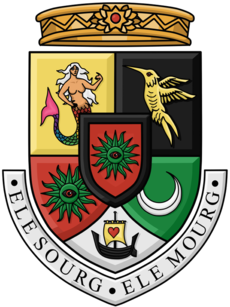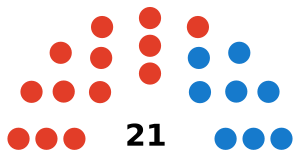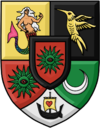Parliament of Sabia and Verona
Parliament of Sabia and Verona atanói | |
|---|---|
| 6th Parliament | |
 | |
| Type | |
| Type | |
Term limits | 1 year |
| History | |
| Founded | 1 October 2015 |
| Preceded by | Courts (Senate and Chamber of Deputies) |
| Leadership | |
President | Félix Gauvier, Democrat since 28 May 2020 |
Vice President | Hidram Cerwyn, Democrat since 28 May 2020 |
| Structure | |
| Seats | 21 MPs (atanoiagi) |
 | |
Political groups | Government
|
| Elections | |
| Party-list proportional representation D'Hondt method | |
Last election | 24 May 2020 |
Next election | On or before 23 May 2021 |
| Meeting place | |
| Darmosari District Alios | |
| Sabia and Verona |
| This article is part of the series |
| Politics and government of Sabia and Verona |
| Constitution |
|---|
| Supreme Court |
| Electoral Commission |
| Foreign relations |
| History |
This article needs to be updated. |
The Parliament of Sabia and Verona (Sabian: atanói; lit. "Assembly") is the legislative body of the Kingdom of Sabia and Verona. Formed in 2015 following the adoption of a new constitution, the Parliament replaced the old bicameral Courts of Sabia and Verona as the nation's legislature. Much of the Parliament's structure, powers and procedure was changed by the Constitution of 2017.
The Parliament is composed of representatives elected from multi-member districts in the Southern Territories, which unlike the self-governing Northern Territories are directly administered by the central government. The authority of the Parliament, however, is still in force in the Northern Territories and the legislature can topple any law passed by the Northern regions' Legislative Assemblies. In this sense, the Parliament represents only a portion of Sabia and Verona's population but still has say over the entire Kingdom.
Since 2017, the Sabioveronese Parliament has used a party-list proportional representation system with two multi-member legislative districts corresponding to the geographical boundaries of the City of Alios and the Gonn Region, the two administrative regions of Metropolitan SiV.
Name
The Sabian word atanói means "assembly", or "gathering"; it's made up of the stem atan-, from the verb ataním ("to gather" or "to put together"), and the abstract suffix -ói. The word is used nearly exclusively for the Sabioveronese legislature; the default nouns for national parliaments of other nations are airañ ("parliament") and toasarabók ("law-making council"). Due to Sabian orthographical rules, atanói (as all other words) is never capitalized. The word is sometimes used in other languages with its definite article suffix (atanoián), as it is typically used in Sabian. The official English language term for the body is "Parliament of Sabia and Verona", and in Spanish (an official language in the Kingdom), the term is "Parlamento de Sabia y Verona".
History
- See also: History of Sabia and Verona
When Sabia and Verona was founded in 2012, the established legislature of the Kingdom was known as the Courts. The Courts were traditionally made up of twenty members, headed by the Prime Minister, who would both as the Kingdom's legislature as well as the judiciary.[1] Although the judicial functions of the Courts were granted to the Commission for the Preservation of Democracy after the signature of the Karasal Treaty.[2] The organization of the Courts remained more or less untouched until the adoption of the 2014 constitution, which turned the unicameral Courts into a bicameral legislature composed of the Senate and the Chamber of Deputies.[3] These were later renamed as the Gentáriven ("House of the People") and the Aierovê ("General Assembly") as part of Sabian nationalist Prime Minister Bertrand Rivière pan-Sabianist reforms.[4] The Gentáriven was further divided into the Council of Elders (which was made up of nationally-appointed legislators) and the Council of Nobles, which was conformed by non-Sabioveronese individuals holding Sabioveronese titles of nobility. The head of the Council of Nobles was known as the Deputy Governor, and the only titleholder was the Austenasian Brooklyn Emmanuel, Marquis of Saamark. Rivière's reforms however proved inneffective and in July 2015 he dissolved the Courts altogether
After the Haronos Plan was devised, the political leaders of the Kingdom met in the Congress of Salisse to write a new constitution. The new constitution vested the Kingdom's legislative authority on the Sarenâ, the "work place", or Parliament. The new constitution replaced the old one on 25 August 2015. The first parliamentary election was held on 20 September 2015, with the National Artists' Guild, a new left-leaning party led by Shounn Virny gaining a majority.
Powers and structure
The Parliament performs the normal functions of a legislature in a parliamentary democracy. It enacts laws, amends the constitution and appoints a government. The Constitution states the Parliament's function is that of the "foremost representative of the Sabioveronese people" (art. 55). Traditionally, the structure and organization of the Sabioveronese Parliament has been influenced by the Westminster system, a trend that has considerably fallen since the adoption of the latest constitutions in 2015 and 2017.
The Constitution states that the Parliament must meet once every two months (ordinary meetings), though the President of the Parliament, the Prime Minister, or a third of all MPs may call for an extraordinary meeting.[5] In practice, most extraordinary meetings are called by the President at the request of a group of MPs. The first session of a new Parliament must be presided over by the King. Parliamentary work usually takes places in the various commissions in which the chamber is divided.
Presidium
The Parliament is chaired by a President (tairág), who is voted on by members of the Parliament. The position was created by the 2017 constitution; before that, the Prime Minister was encharged with chairing each Parliament session. The President of the Parliament counts with a single deputy, the Vice President, who typically belongs to the President's party. The President of the Parliament typically belongs to the party which holds the majority of seats in Parliament, and as such, is also typically a member of the ruling party. The current President is Félix Gauvier (HG–Gonn).
Opposition forces are usually led by a Leader of the Opposition, whose position is not mentioned in the constitution or any law, but has existed de facto since the formation of Sabia and Verona.
The following MPs have been Presidents of the Parliament since the position's formation in 2017:
| # | Name | Parliament | Term of office | Party | Constituency |
|---|---|---|---|---|---|
| 1 | Donnel Seaworth | 3rd | 23 May 2017 – 28 May 2018 | Liberal | Alios (list) |
| 2 | Dímeros Grenouille | 4th | 28 May 2018 – 3 June 2019 | Liberal | Alios (list) |
| 3 | Narcissus Clyne | 5th | 3 June 2019 – 28 May 2020 | Democrat | Alios (list) |
| 4 | Félix Gauvier | 6th | 28 May 2020 – Incumbent | Democrat | Gonn (list) |
Government formation
After an election, any elected MP from any party may request for the King's mandate to form a government and become Prime Minister (Sabian: kuragikurág). In practice, party leaders are typically the ones to be given mandates, though in the past, "Prime Minister candidates" have been nominated to form governments instead of party leaders (of these, only Osez Kóvérsz has successfully formed a government). Once given a mandate, a Prime Minister-designate must submit a "government proposal" to Parliament, which either approves it or rejects it through a simple majority vote. If no government proposal is approved by Parliament in a period of 30 days after an election, the King will dissolve Parliament and call for a new election, to be held within a period of 15 days after the Parliament is dissolved.
Last election
The last parliamentary election was held on 24 May 2020; the elected members sat for the first time on 28 May 2020 and became the 6th Parliament.[6]

| |||||||
| Party | Votes | % | Seats | +/– | |||
|---|---|---|---|---|---|---|---|
| Democratic Party (HG/A) | 32 | 59.26% | 13 | ▲1 | |||
| Liberals (J/C) | 20 | 37.04% | 8 | ▼1 | |||
| Blank votes | 2 | 3.70% | — | ||||
| Total | 54 | 100 | 21 | ||||
| Registered voters/turnout | 61 | 88.52% | — | ||||
| Source: Iderobók | |||||||
Current composition
| District | MP | Party | Notes | |
|---|---|---|---|---|
| Alios | Andrew Blackhorse | Liberal | ||
| Étienne Boulin | Democrat | |||
| Apollo Cerwyn | Democrat | Prime Minister | ||
| Hidram Cerwyn | Democrat | Vice President of the Parliament | ||
| Narcissus Clyne | Democrat | Government secretary | ||
| Simor de Jena | Liberal | Opposition speaker | ||
| Pomme-Gabrielle Gauvier | Democrat | Government secretary | ||
| Snø Jens-Galieri | Democrat | Government secretary | ||
| Boris Tovinski | Democrat | |||
| Gonn | Harmê Bertram | Liberal | Opposition speaker | |
| Félix Gauvier | Democrat | President of the Parliament | ||
| Kastor Gevras Drigy | Democrat | Government secretary | ||
| Suipom Goyo | Democrat | Government secretary | ||
| Dímeros Grenouille | Liberal | Opposition spaker | ||
| Soraya Hreti | Democrat | Government secretary | ||
| Hierba Kebragi | Democrat | Government secretary | ||
| Shassel Marlaryen | Liberal | Opposition speaker | ||
| Ryam Piper | Democrat | |||
| Donnel Seaworth | Liberal | |||
| Emmanuel Starlynn | Liberal | |||
| Shounn Virny | Liberal | Opposition leader | ||
References
- ↑ "Alcabala sees the tricolour flag rising". The SiV Phonograph. 20 October 2012.
- ↑ "Language reform, Karasal Treaty and Ryəmoništa". The SiV Phonograph. 16 December 2012.
- ↑ "Left Alliance wins the election". The SiV Phonograph. 20 March 2014.
- ↑ "Dreaming big: The Aishayerovê and the beginning of a new era". The SiV Phonograph. 1 October 2014.
- ↑ Constitution of Sabia and Verona, Title VI, Art. 66.
- ↑ "Decision 2020: Democrats win in landslide as Liberals suffer worst result since 2014". The SiV Phonograph. 24 May 2020. Retrieved 28 May 2020.

